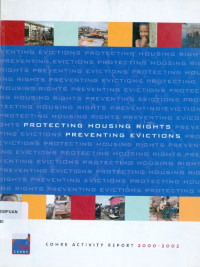
Text
Protecting housing rights preventing evictions
At its height in 2008, COHRE maintained offices in Switzerland, Ghana, South Africa, Sri Lanka, Cambodia, Brazil and the United States and carried out work through three Regional Programmes covering Africa, Asia and the Americas as well as five Thematice Programmes covering economic, social and cultural rights strategic litigation; women and housing rights; forced evictions; housing and land restitution; and the rights to water and sanitation. As of the end of 2011, COHRE maintained registered offices in the Asia-Pacific region (Cambodia) and Africa (Kenya). These remaining offices coordinated regional and local activities in pursuit of COHRE’s mission. COHRE’s mission is to ensure the full enjoyment of the human right to adequate housing for everyone, everywhere, including preventing forced evictions of persons, families and communities from their homes or lands. COHRE ceased operations in early 2012.
COHRE had been granted Special Consultative Status by the United Nations Economic and Social Council (ECOSOC, 1999), and the Organisation of American States (OAS, 2002), and had participatory status with the Council of Europe (CoE, 2003) as well as Observer Status with the African Commission on Human and Peoples' Rights. During more than a decade of promoting housing rights throughout the world, COHRE learnt that there is no single methodology that can address the wide range of processes undermining the right to adequate housing. This is because the problem of housing rights is simply too pervasive, the causes too diverse, for blueprint responses or methodologies to be effective[citation needed]. For example, a particular housing rights violation, such as a mass forced eviction, could be the result of a locally administered development project that has been initiated by the national government, in the context of an externally enforced financial restructuring programme, and funded by international donor organisations. It could be caused by a combination of rapid urbanisation, pervasive tenure insecurity, and political conflict. It might be the consequence of inadequate legal protection for the poor. Again, it might be the result of preparations to host a mega-event such as a world cup tournament or the Olympic Games.
Availability
| KP.1.00093 | KP.1 INT p | My Library | Available |
Detail Information
- Series Title
-
-
- Call Number
-
KP.1 INT p
- Publisher
- Jenewa : Centre on Housing Rights and Evictions (COHRE)., 2003
- Collation
-
75p. : ill, ; 28cm.
- Language
-
English
- ISBN/ISSN
-
9295004264
- Classification
-
KP.1
- Content Type
-
-
- Media Type
-
-
- Carrier Type
-
-
- Edition
-
-
- Subject(s)
- Specific Detail Info
-
-
- Statement of Responsibility
-
-
Other version/related
No other version available
File Attachment
Comments
You must be logged in to post a comment
 Computer Science, Information & General Works
Computer Science, Information & General Works  Philosophy & Psychology
Philosophy & Psychology  Religion
Religion  Social Sciences
Social Sciences  Language
Language  Pure Science
Pure Science  Applied Sciences
Applied Sciences  Art & Recreation
Art & Recreation  Literature
Literature  History & Geography
History & Geography